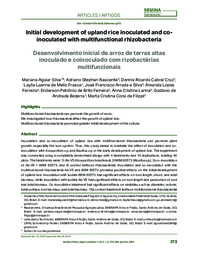Publicações
Initial development of upland rice inoculated and co-inoculated with multifunctional rhizobacteria.
Autoria: SILVA, M. A.; NASCENTE, A. S.; CRUZ, D. R. C.; FRASCA, L. L. de M.; SILVA, J. F. A. e; FERREIRA, A. L.; FERREIRA, E. P. de B.; LANNA, A. C.; BEZERRA, G. de A.; FILIPPI, M. C. C. de
Resumo: Inoculation and co-inoculation of upland rice with multifunctional rhizobacteria can promote plant growth, especially the root system. Thus, this study aimed to evaluate the effect of inoculation and co-inoculation with Azospirillum sp. and Bacillus sp. in the early development of upland rice. The experiment was conducted using a completely randomized design with 4 treatments and 10 replications, totaling 40 plots. The treatments were: 1) Ab-V5 (Azospirillum brasilense), 2) BRM 63573 (Bacillus sp.), 3) co-inoculation of Ab-V5 + BRM 63573, and 4) control (without rhizobacteria). Inoculation and co-inoculation with the multifunctional rhizobacteria Ab-V5 and BRM 63573 provided positive effects on the initial development of upland rice. Inoculation with isolate BRM 63573 had significant effects on root length, shoot, and total biomass, while inoculation with isolate Ab-V5 had significant effects on root length and production of root and total biomass. Co-inoculation treatment had significant effects on variables such as diameter, volume, total surface, root biomass, and total biomass. The control treatment (without multifunctional rhizobacteria) had the worst results for most of the analyzed variables.
Ano de publicação: 2023
Tipo de publicação: Artigo de periódico
Unidade: Embrapa Arroz e Feijão

